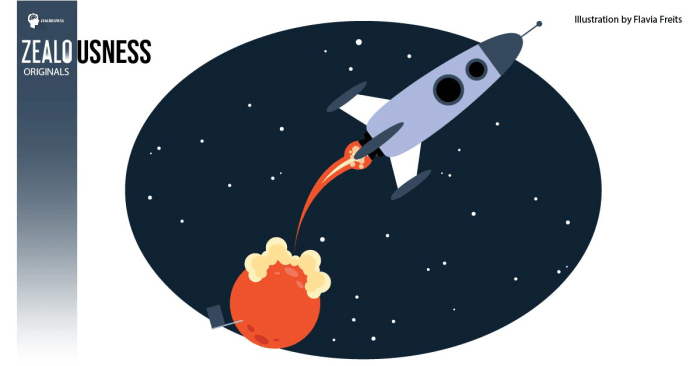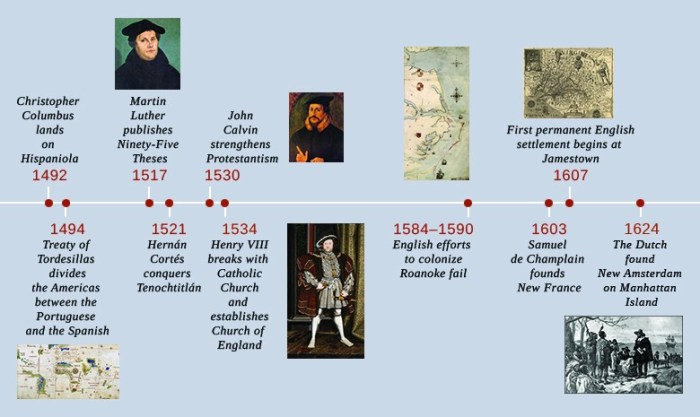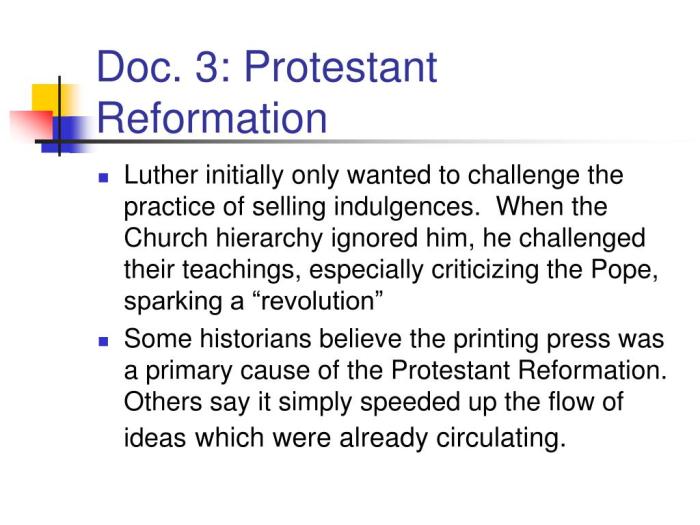Exploration or reformation which was the more important consequence – Exploration and reformation stand as pivotal forces that have shaped the tapestry of human history. This discourse delves into the question of which holds greater significance: exploration, the intrepid voyages that expanded geographical knowledge and cultural horizons, or reformation, the transformative movements that reshaped religious, political, and societal landscapes.
By comparing their short-term and long-term consequences across various domains, we aim to shed light on their relative importance.
Exploration vs. Reformation: Defining Key Concepts

Exploration and reformation are two significant historical processes that have shaped the course of human history. Exploration refers to the process of discovering new lands and exploring the unknown, while reformation involves the process of changing or reforming existing beliefs, institutions, or practices.
Both exploration and reformation have played crucial roles in shaping the world we live in today. Exploration has led to the discovery of new continents, the expansion of knowledge, and the development of new technologies. Reformation, on the other hand, has sparked religious, political, and social revolutions, leading to the establishment of new ideas and the transformation of societies.
Similarities and Differences, Exploration or reformation which was the more important consequence
Exploration and reformation share some similarities. Both processes involve venturing into the unknown, taking risks, and challenging established norms. They both require a spirit of adventure, curiosity, and a willingness to embrace change.
However, there are also key differences between exploration and reformation. Exploration is primarily focused on the physical world, while reformation is concerned with the realm of ideas and beliefs. Exploration is often driven by a desire for knowledge and adventure, while reformation is often motivated by a desire for change and improvement.
Exploration as a Catalyst for Change: Exploration Or Reformation Which Was The More Important Consequence

Exploration has been a major catalyst for change throughout history. The discovery of new lands by European explorers in the 15th and 16th centuries led to the Columbian Exchange, which had a profound impact on the economies, cultures, and populations of both the Americas and Europe.
Exploration has also played a key role in the development of science and technology. The voyages of explorers such as Christopher Columbus and Vasco da Gama led to the development of new navigational techniques, maps, and instruments. These advances in science and technology made it possible for further exploration and the expansion of human knowledge.
Examples of Exploration’s Impact
- The discovery of the Americas by Christopher Columbus led to the colonization of the New World and the establishment of new European empires.
- The exploration of the Pacific Ocean by James Cook led to the discovery of new islands and the expansion of European trade and influence in the Asia-Pacific region.
- The exploration of the Arctic and Antarctic regions in the 19th and 20th centuries led to new scientific discoveries and a better understanding of the Earth’s climate and environment.
Reformation as a Driving Force for Social Transformation

Reformation has also been a powerful force for social transformation. The Protestant Reformation in the 16th century led to the establishment of new Protestant churches and the separation of the Catholic Church from the rest of Europe. This religious upheaval had a profound impact on the political, social, and economic landscape of Europe.
Other reformation movements, such as the American Revolution and the French Revolution, have also had a major impact on the development of modern society. These revolutions led to the establishment of new governments, the spread of democratic ideals, and the expansion of human rights.
Examples of Reformation’s Impact
- The Protestant Reformation led to the establishment of new Protestant churches and the separation of the Catholic Church from the rest of Europe.
- The American Revolution led to the establishment of the United States of America and the spread of democratic ideals.
- The French Revolution led to the overthrow of the monarchy and the establishment of a republic.
Evaluating the Relative Importance of Exploration and Reformation

It is difficult to definitively say which is more important, exploration or reformation. Both processes have played a vital role in shaping human history and society. Exploration has led to the discovery of new lands, the expansion of knowledge, and the development of new technologies.
Reformation has sparked religious, political, and social revolutions, leading to the establishment of new ideas and the transformation of societies.
Ultimately, the relative importance of exploration and reformation depends on the specific context and time period being considered. In some cases, exploration may have been more important, while in other cases, reformation may have had a greater impact.
Comparative Table
| Area of Impact | Exploration | Reformation |
|---|---|---|
| Knowledge | Discovery of new lands and cultures | New ideas and beliefs |
| Technology | Development of new navigational techniques and instruments | Spread of printing and literacy |
| Society | Establishment of new empires and trade networks | Religious and political revolutions |
| Culture | Exchange of ideas and cultural practices | New artistic and literary movements |
FAQ Insights
What is the primary distinction between exploration and reformation?
Exploration involves physical journeys to discover new lands and cultures, while reformation encompasses intellectual and social movements that seek to change existing systems and beliefs.
How did exploration contribute to the expansion of knowledge?
Explorers brought back accounts of new lands, flora, fauna, and peoples, significantly expanding the collective understanding of the world.
What were some of the key outcomes of the reformation?
The reformation led to the establishment of new religious denominations, challenged the authority of the Catholic Church, and sparked political and social upheavals.